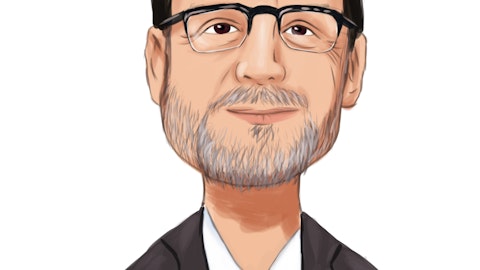As a reminder, of the $12.3 million of restricted cash, $8.7 million will sit in a trust account for the duration of the ABS notes. The remaining $3.6 million reflects the cash collections from the securitized assets and is distributed monthly as interest to the noteholders, fees to third-parties and with the remaining funds coming back to Ting. I will also note that we generated $1.3 million in interest income this quarter. During the quarter, we had $9.0 million in cash from operations compared with $2.9 million in Q4 last year, with the increase driven primarily by working capital timing and efficiency, a timing reset of quarterly syndicated interest payments into the first week of the following quarter. We invested $14.6 million in property and equipment, primarily for the continued buildout of the Ting Fiber network, in addition to the continued investment in the Wavelo platform.
Note that this number reflects the actual cash paid for capital assets in the quarter on our cash flow statement and includes capitalized cash interest. As of December 31, 2023, our syndicated loan balance for covenant calculation purposes was a net $205 million when factoring in letters of credit and cash on hand of up to $7.5 million, which resulted in a leverage ratio of 3.42x. This is the third consecutive quarter we have reduced the leverage ratio. We repaid a net $11.5 million on the balance of the loan this quarter and expect quarterly repayments to continue. Finally, deferred revenue at the end of Q4 was $148 million, down from $150 million for the third quarter of 2023, but up from $145 million for the fourth quarter of last year. This is primarily due to the stabilization of Domains revenues now that the pandemic impacts have normalized.
That concludes my remarks, and I’ll now turn it back to Elliot.
Elliot Noss: Thanks, Dave. Let me start with guidance for our businesses for 2024. For Tucows Domains, we’re giving Adjusted EBITDA guidance of $43 million. For Wavelo, we’re giving guidance of $8 million to $10 million. And for our Corporate segment, $2 million to $4 million for a total of $53 million to $57 million. Given the recent changes at Ting, we’re working through a more refined guidance estimate for that business, which we will share with you when we have it, but in no event later than next quarter’s results and with an intention of reducing the EBITDA loss. As I start to look out over 2024, I see clear paths for all three businesses. For Tucows Domains: turn the new offerings into real contributors. For Wavelo: generate a pipeline of new customers.
For Ting: clean up the balance sheet and load the network. With Ting, I find myself thinking about time and timing. Time in the sense of the pace of the coax- to-fiber transition in the U.S. Timing in the sense that when one engages in anythingdealing with the balance sheet or the cap table, when is often more important than what. And timing of the coax-to-fiber transition is one arc, while macroeconomic conditions areanother. Let’s call those micro and macro. Fiber and the general economy. We feel very good about where we are in the fiber arc. We, and the industry, are now comfortably into the execution phase of this cycle. We see a LOT of building activity across country. We believe the industry is 18 to 36 months away from most footprints that will be part of this cycle being commenced.
There will still be three to five years of building after that, but, in our view, it is too late for new entrants and it will shortly be too late for new footprints. We are well positioned in the first tier of middle-market players. While we have capital to take us through the next leg of our build, I have been clear that this level of EBITDA losses and this level of debt are not acceptable. This is primarily because we do not want to risk being in a position of need in this macro environment. That means we are looking to strengthen our balance sheet. As I have said numerous times over numerous earnings calls, we are lucky to have lots of different arrows in the quiver. We are not, however, in the best macro environment to be dealing with this.
There are two thoughts I want to be clear about, and these two thoughts are the reason I have presented this story to this point. First, the micro arc dominates the macro arc. By that I mean that making sure that Ting is in position to benefit from this generational transition to infrastructure purpose built for the Internet is the most important thing. The fiber-to-the-home business takes a lot of capital, effort and patience. It makes money slowly, and for a long time. Second, strengthening the balance sheet is a means to an end. Whatever we do in the nearer term will simply be putting us in position to create long-term value for shareholders for a long time to come. If we would have sat down in 2014 and shown ourselves the future in 2024, we would have been very pleased.
We would have seen a strong and growing fiber footprint, a fascinating evolution in the structural separation between ownership of infrastructure and operating an ISP. And, most importantly, we would have seen Ting as an ISP with industry-leading take rate, churn and customer satisfaction. All of which is a recipe for long-term success. And with that, I look forward to your written questions and exploring areas that interest you in greater detail. Again, please send your questions to ir@tucows.com by February 29, and look for our recorded Q&A audio response and transcript to this call to be posted to the Tucows website on Tuesday, March 12th, at approximately 4 p.m. Eastern time. Thank you.
Q – :
Follow Tucows Inc (NASDAQ:TCX)
Follow Tucows Inc (NASDAQ:TCX)
Receive real-time insider trading and news alerts





